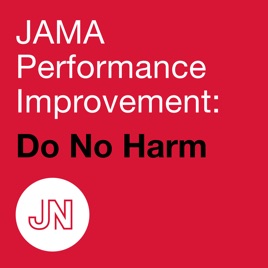
Advertise on podcast: JAMA Performance Improvement: Do No Harm
Rating
4.4 from
Country
This podcast has
15 episodes
Language
Publisher
Explicit
No
Date created
2016/09/21
Average duration
25 min.
Release period
125 days
Description
From the JAMA Network, this is JAMA Performance Improvement: Do No Harm, the podcast about performance improvement and medicine that aims to elevate the quality of care, one patient at a time, with host Ed Livingston, MD.
Social media
Check JAMA Performance Improvement: Do No Harm social media presence
Podcast episodes
Check latest episodes from JAMA Performance Improvement: Do No Harm podcast
A Better Way to Manage Chronic Medical Conditions in Homeless Emergency Department Patients
2020/12/22
Homeless patients with chronic medical conditions who need long-term care often repeatedly present to emergency departments to receive treatment. Following a performance improvement analysis, clinicians at UCSF developed an emergency department–based team who work with the community to provide care for this challenging population. Hemal Kanzaria, MD, and Jack Chase, MD, discuss how UCSF has addressed this clinical problem.
Related Article(s) available here
more
Improving Management of Elevated Liver Function Tests in Post Liver Transplant Patients
2020/11/10
There are hundreds of thousands of liver transplant patients, all of whom will be seen in general clinical practices. It is common for them to develop elevated liver enzymes—a potentially serious problem that may be a sign that the transplanted liver is failing. Traditionally, patients with these findings are sent to a liver transplant center for an inpatient workup. A new protocol facilitating management of most of these patients in routine outpatient clinics has been developed, greatly improving the efficiency of managing patients with this clinical problem. Fady Kaldas, MD, director of the Dumont-UCLA transplant center, discusses how to manage elevated liver function results in liver transplant patients on an outpatient basis.
Related Article(s):
Outpatient Management of Liver Function Test Abnormalities in Patients With a Liver Transplant
more
The Aging Clinician: When Should Older Clinicians' Cognitive Abilities Be Evaluated?, Part 2
2020/04/28
As physicians age, they experience the inevitable decline of cognitive and physical function. It is not clear how that affects clinical practice. Jeffrey Saver, MD, vice chair of neurology at UCLA and a JAMA Associate Editor, discusses how to best assess the clinical performance of aging physicians.
The Aging Clinician: When Should Older Clinicians' Cognitive Abilities Be Evaluated?, Part 1
Read the article:
Cognitive Testing of Older Clinicians Prior to Recredentialing
more
The Aging Clinician: When Should Older Clinicians' Cognitive Abilities Be Evaluated?, Part 1
2020/01/14
More than a third of the physician workforce is older than 60 years, and 10% are older than 70 years. Cognitive abilities may decline with age but how cognition affects clinical practice is unknown. It is also not clear how clinicians’ cognitive ability can be measured and acted upon when diminished without committing age discrimination. Two major academic hospitals launched programs to test cognitive abilities in older physicians applying for renewal of their medical staff privileges. It went well for one and not well for the other hospital. Yet, in the hospital where the testing program was carried out, several clinicians who were not suspected of having any problems had profoundly affected cognition. Leo Cooney, MD, from Yale-New Haven Medical Center, and Anne Weinacker, MD, from Stanford Health Care, discuss their experiences in dealing with these difficult issues.
The Aging Clinician: When Should Older Clinicians' Cognitive Abilities Be Evaluated?, Part 2
Read the article: Cognitive Testing of Older Clinicians Prior to Recredentialing
more
How to Reduce Emergency Department Dwell Time
2019/03/19
Chaos in the emergency department is common. How to fix it is not always clear. Mary P. Mercer, MD, MPH, from the University of California, San Francisco, discusses how they successfully fixed their long dwell times at the emergency department at San Francisco General Hospital. Their solution was to create a fast-track unit that managed low-acuity patients separately from the rest of the emergency department cases. The most important aspect of this quality improvement effort was the ongoing and regular engagement of executives from the medical center with frontline staff.
Read the article: Reducing Emergency Department Length of Stay
more
Poof – It’s Gone – The Disappearing Order That Led to a Patient Getting an Unnecessary Procedure
2019/01/18
Electronic health records are the bane of most clinicians’ existence. They were supposed to help us but not only have they made life more difficult for clinicians, they are the cause of medical errors. Described here is a case of the patient receiving an unnecessary procedure because an order was not canceled in an EHR where it had disappeared from the clinicians’ view. A second theme in this case that is consistent in nearly all of the JAMA Performance Improvement articles to date is inadequate communication among clinicians.
more
EMRs Gone Bad: How Order Sets Can Result in Medication Errors
2018/03/27
One promise of electronic medical records (EMRs) was to reduce medication errors. That may not have occurred since one type of error, illegible orders, has been replaced by another: Order sets may incorrectly match a patient and necessary treatments. In this JAMA Performance Improvement podcast, we review a case in which guideline-based care was incorporated into an order set, then the guideline changed but the order set did not, resulting in a post-STEMI patient receiving β-blockers when they were contraindicated. Interviewees included Arjun Gupta, MD, University of Texas Southwestern Medical Center, and Jennifer L. Rabaglia, MD, MSc, Parkland Health and Hospital System, Dallas, Texas.
Learning Objectives: To understand the role of β-blocker treatment in patients with acute myocardial infarction; to understand how EMR order sets should be developed and maintained.
https://jamanetwork.com/journals/jama/fullarticle/10.1001/jama.2018.0845
more
The Not-So-Good Idea of Sedating Patients Who Have Obstructive Sleep Apnea
2018/02/06
One-third of the US population is obese. Obesity is a major risk factor for obstructive sleep apnea. This condition is very common, and patients with sleep apnea are at risk of major complications from sedation. This JAMA Performance Improvement podcast reviews a case of a patient who did poorly after he was sedated for a medical procedure. Interviewees include Joshua Pevnick, MD, MSHS, from Cedars-Sinai Medical Center, and Jason R. Farrer, MD, from Northwestern Medical Faculty Foundation.
Related article: Oversedation of a Patient With Obstructive Sleep Apnea Prior to Imaging
more
What to Do When There Is an Overdose of Insulin
2017/12/26
It is very easy to confuse drug concentrations and vials containing different amounts of drugs in the hospital setting. It is not uncommon to have dosing errors occur. In this podcast, we discuss how to manage an overdose of insulin and also how to implement preventive measures in the hospital environment to minimize the risk of drug dosing errors. Interviewees include Cynthia Barnard, PhD, MBA, MSJS, from Northwestern Memorial HealthCare, Lara K. Ellinger, PharmD, BCPS, from Northwestern Memorial Hospital, and Keith Hemmert, MD, from Northwestern Memorial HealthCare.
Read the article: Insulin Dosing Error in a Patient With Severe Hyperkalemia
more
Avoiding Wrong-Site Surgery
2017/11/28
There are about 500 wrong-site surgeries performed in the United States every year. Simple maneuvers can minimize the risk for these occurring. This JAMA Performance Improvement podcast reviews a case of wrong-site surgery and discusses potential ways to avoid it.
Interviewees include Armando Giuliano, MD, Harry Sax, MD, Kathryn Englehart, MD, and David Baker, MD, from The Joint Commission.
Read the article: Wrong-Site Surgery
Author Affiliations:
Armando Giuliano, MD, Executive Vice Chairman, Department of Surgery, Cedars-Sinai Medical Center, Los Angeles
Harry C. Sax, MD, Executive Vice Chair, Administration Department of Surgery, Cedars-Sinai Medical Center, Los Angeles
Kathryn Englehart, MD, Research Fellow, Department of Surgery, Northwestern University
David Baker, MD, Executive Vice President, Division of Health Care Quality Evaluation, The Joint Commission
more
Podcast reviews
Read JAMA Performance Improvement: Do No Harm podcast reviews
Atieh
2018/08/26
Valuable information
This is the only podcast that I enthusiastically wait for the next episode. Every health care professional should be familiar with the situations that...
more
PathMax
2017/08/26
I took their advice on
being exposed to dishonest superior physicians and got counseling. I think it's helping.
Fromthestage
2016/09/22
Engaging and interesting presentation
I really enjoyed the first episode of this podcast, so much so that I just subscribed. Ed is a terrific host and moderator. In fact, all of the recent...
more
Podcast sponsorship advertising
Start advertising on JAMA Performance Improvement: Do No Harm & sponsor relevant audience podcasts
You may also like these medicine Podcasts

4.7
65
100
The Deadly Dose
Harini Bhat & Megan Gesner

4.9
664
140
EMS 20/20
Christopher M Pfingsten, Spencer Oliver

4.8
4943
85
FoundMyFitness
Rhonda Patrick, Ph.D.

4.8
3001
477
The Curbsiders Internal Medicine Podcast
The Curbsiders Internal Medicine Podcast

4.8
70
128
Progress Your Health Podcast
Dr Robert Maki and Dr Valorie Davidson

4.8
2400
311
Paul Saladino MD podcast
Paul Saladino, MD

4.3
22
990
Clinical Chemistry Podcast
Association for Diagnostics and Laboratory Medicine

4.9
3048
541
The Exam Room by the Physicians Committee
Physicians Committee

4.8
1813
161
RFK Jr Podcast
Robert Kennedy Jr

4.6
511
605
Psychedelics Today
Psychedelics Today



